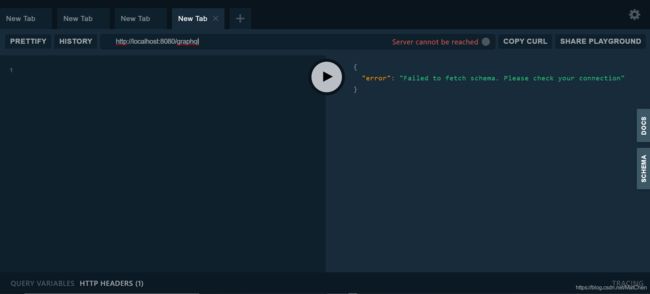GraphQL接口查询语言初步学习
A query language for your API
最近公司经常用到这东西,小编出于兴趣,学习一二,记录如下,如有不妥,还望多多指教。
一 概述
GraphQL是一种用于api的查询语言,在项目运行时对现有数据的一种查询方式。GraphQL为API中的数据提供了一个完整的、可理解的描述,允许客户端要求他们真正需要的东西,使API更容易随着时间的推移而发展,并支持强大的开发工具。
同级可对比APIJson,个人感觉apiJson在Java开发中比较实用和简单,如权限验证通过 @ MethodAccess 注解Model来添加角色对表的操作权限,以及支持远程函数调用,而相对比,graphql学习难度和成本以及规范性,都比较高。不过技多不压身,今天咱来看看。
(APIjson个人感觉可参考该博客,感觉还不错https://blog.csdn.net/u014618954/article/details/107021638/)
二 初步展示
graphql是api的查询语言,在一定程度上使开发更加高效和便捷,一下是一个例子。
例如,一个GraphQL服务告诉我们登录用户是谁(me)以及该用户的名字可能是这样的:
①创建
在这些类型上定义类型和字段,然后为每种类型的每个字段提供函数。
type Query {
me: User
}
type User {
id: ID
name: String
}
function Query_me(request) {
return request.auth.user;
}
function User_name(user) {
return user.getName();
}
②查询
{
me {
name
}
}
③返回
{
"me": {
"name": "Luke Skywalker"
}
}
上述为查询query,可根据name查询所有对应名字的name,以及通过type,多参等查询优点,具体也不多说,可参考graphql官方文档,简单讲解分为三点,如下。
应用场景:
①多平台等原因导致的字段冗余
②一个页面多次调用聚合数据
③经常改动接口且精简逻辑
三 实际应用
讲了半天湿的,下面来点干货,本次演示Java和go两种语言的基本使用
3.1 java+spring boot+graphql
我们的示例应用程序将是一个简单的API,用于获取特定书籍的详细信息。
① 构建目录
Select:
Gradle Project
Java
Spring Boot 2.1.x
Project metadata
Group: com.graphql-java.tutorial
Artifact: book-details
Dependency
web
② 添加基础依赖
com.graphql-java:graphql-java:11.0 // NEW
com.graphql-java:graphql-java-spring-boot-starter-webmvc:1.0 // NEW
com.google.guava:guava:26.0-jre // NEW
org.springframework.boot:spring-boot-starter-web
org.springframework.boot:spring-boot-starter-test
}
③ 创建相关文件
在src/main/resources目录下创建 schema.graphqls
//该部分是一个关于书籍的基本类型的定义,并与后续类型的查询有关
type Query {
bookById(id: ID): Book
}
type Book {
id: ID
name: String
pageCount: Int
author: Author
}
type Author {
id: ID
firstName: String
lastName: String
}
在com.graphqljava.tutorial.bookdetails目录下创建GraphQLProvider.class,并创建一个GraphQL实例:
@Component
public class GraphQLProvider {
private GraphQL graphQL;
@Bean
public GraphQL graphQL() {
return graphQL;
// 这个GraphQL实例通过使用@Bean注释的GraphQL()方法公开为一个Spring Bean
}
@PostConstruct
public void init() throws IOException {
//使用Guava资源从类路径读取文件
URL url = Resources.getResource("schema.graphqls");
//GraphQL Java Spring适配器将使用该GraphQL实例使我们的模式通过HTTP在默认url /
String sdl = Resources.toString(url, Charsets.UTF_8);
//创建一个GraphQLSchema和GraphQL实例
GraphQLSchema graphQLSchema = buildSchema(sdl);
this.graphQL = GraphQL.newGraphQL(graphQLSchema).build();
}
@Autowired
GraphQLDataFetchers graphQLDataFetchers;
//抓取数据
private GraphQLSchema buildSchema(String sdl) {
TypeDefinitionRegistry typeRegistry = new SchemaParser().parse(sdl);
RuntimeWiring runtimeWiring = buildWiring();
SchemaGenerator schemaGenerator = new SchemaGenerator();
return schemaGenerator.makeExecutableSchema(typeRegistry, runtimeWiring);
}
/*buildWiring使用graphQLDataFetchers bean实际注册两个DataFetchers:
一个用于检索具有特定ID的图书
一个用于获取特定书籍的作者*/
private RuntimeWiring buildWiring() {
return RuntimeWiring.newRuntimeWiring()
.type(newTypeWiring("Query")
.dataFetcher("bookById", graphQLDataFetchers.getBookByIdDataFetcher()))
.type(newTypeWiring("Book")
.dataFetcher("author", graphQLDataFetchers.getAuthorDataFetcher()))
.build();
}
}
重要的接口(不用自己创):
DataFetcher是一个带有单个方法的接口,它只接受DataFetcherEnvironment类型的单个参数;
当GraphQL Java执行查询时,它会为在查询中遇到的每个字段调用适当的数据表器。
public interface DataFetcher {
T get(DataFetchingEnvironment dataFetchingEnvironment) throws Exception;
}
让我们假设有一个不匹配的图书映射有一个关键totalPages而不是pageCount。这将导致每本书的pageCount值为空,因为PropertyDataFetcher无法获取正确的值。为了解决这个问题,你必须为Book注册一个新的DataFetcher(本文案例不需要)
// 在 GraphQLDataFetchers class
// 实现 DataFetcher
public DataFetcher getPageCountDataFetcher() {
return dataFetchingEnvironment -> {
Map book = dataFetchingEnvironment.getSource();
return book.get("totalPages");
};
}
创建一个新的类GraphQLDataFetchers,其中包含书籍和作者的示例列表
@Component
public class GraphQLDataFetchers {
private static List> books = Arrays.asList(
ImmutableMap.of("id", "book-1",
"name", "Harry Potter and the Philosopher's Stone",
"pageCount", "223",
"authorId", "author-1"),
ImmutableMap.of("id", "book-2",
"name", "Moby Dick",
"pageCount", "635",
"authorId", "author-2"),
ImmutableMap.of("id", "book-3",
"name", "Interview with the vampire",
"pageCount", "371",
"authorId", "author-3")
);
private static List> authors = Arrays.asList(
ImmutableMap.of("id", "author-1",
"firstName", "Joanne",
"lastName", "Rowling"),
ImmutableMap.of("id", "author-2",
"firstName", "Herman",
"lastName", "Melville"),
ImmutableMap.of("id", "author-3",
"firstName", "Anne",
"lastName", "Rice")
);
public DataFetcher getBookByIdDataFetcher() {
return dataFetchingEnvironment -> {
String bookId = dataFetchingEnvironment.getArgument("id");
return books
.stream()
.filter(book -> book.get("id").equals(bookId))
.findFirst()
.orElse(null);
};
}
public DataFetcher getAuthorDataFetcher() {
return dataFetchingEnvironment -> {
Map book = dataFetchingEnvironment.getSource();
String authorId = book.get("authorId");
return authors
.stream()
.filter(author -> author.get("id").equals(authorId))
.findFirst()
.orElse(null);
};
}
}
加入application的main方法启动项目测试
package com.graphqljava.tutorial.bookdetails;
import org.springframework.boot.SpringApplication;
import org.springframework.boot.autoconfigure.SpringBootApplication;
@SpringBootApplication
public class BookDetailsApplication {
public static void main(String[] args) {
SpringApplication.run(BookDetailsApplication.class, args);
}
}
可通过网页版测试https://cpq-dev.ext.hp.com/playground

可以很清晰的拿到结果了
(该playground可自行安装相应测试软件,如postman,altair,本文使用网页版,如有问题可参考源码:https://github.com/graphql-java/tutorials)
3.2 Golang+graphql
① 安装相应支持
go get github.com/graphql-go/graphql
(此目录为path目录下,之前博客有讲导包问题,可前往浏览,如不知道自己项目path目录,可用 go Current GOPATH 命令查找)
② 应用举例
下面是一个简单的例子,它定义了一个带有hello字符串类型字段的模式和一个返回字符串世界的Resolve方法。对该模式执行GraphQL查询,结果输出以JSON格式打印
package main
import (
"encoding/json"
"fmt"
"log"
"github.com/graphql-go/graphql"
)
func main() {
// Schema
fields := graphql.Fields{
"hello": &graphql.Field{
Type: graphql.String,
Resolve: func(p graphql.ResolveParams) (interface{}, error) {
return "world", nil
},
},
}
rootQuery := graphql.ObjectConfig{Name: "RootQuery", Fields: fields}
schemaConfig := graphql.SchemaConfig{Query: graphql.NewObject(rootQuery)}
schema, err := graphql.NewSchema(schemaConfig)
if err != nil {
log.Fatalf("failed to create new schema, error: %v", err)
}
// Query
query := `
{
hello
}
`
params := graphql.Params{Schema: schema, RequestString: query}
r := graphql.Do(params)
if len(r.Errors) > 0 {
log.Fatalf("failed to execute graphql operation, errors: %+v", r.Errors)
}
rJSON, _ := json.Marshal(r)
fmt.Printf("%s \n", rJSON) // {"data":{"hello":"world"}}
}
上述为简单示例,更多有趣复杂案例推荐可前往
https://github.com/graphql-go/graphql/tree/master/examples/
https://github.com/graphql-go/graphql/blob/master/graphql_test.go 学习
本人也是对graphql初步学习,也希望大佬多多提建议
本文参考学习于
https://graphql.org/官网及相关git源码
个人推荐https://blog.csdn.net/qq_41882147/article/details/82966783,挺详细,介绍也比较实际,可适合进阶学习